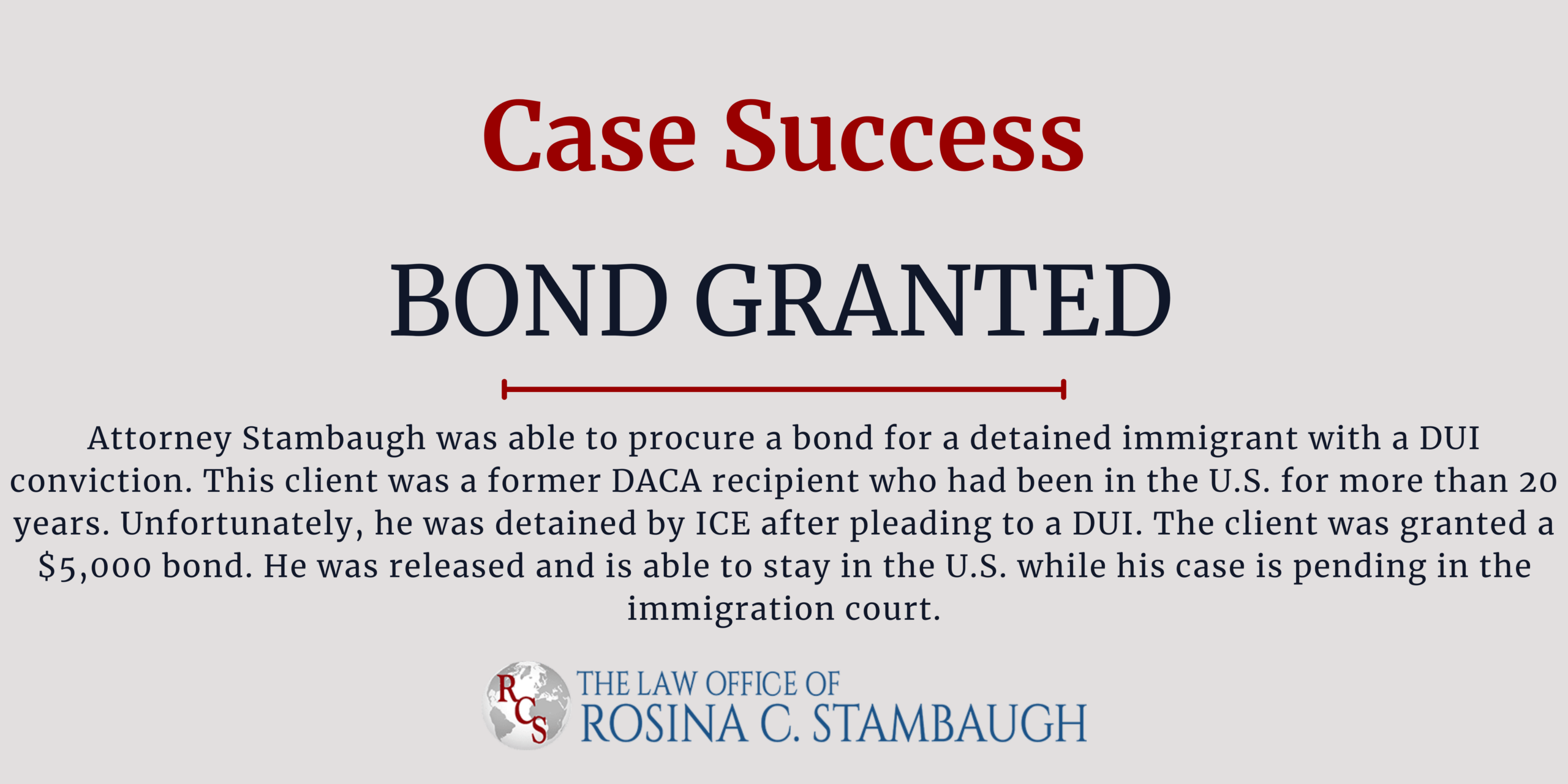Immigration Bonds & Bond Hearings
What Is a Bond in Immigration?
A bond is money paid to the government in return for the detainee’s release. It is a guarantee that the detainee will go to all court hearings and comply with the judge’s final order.
Who Sets the Immigration Bond?
ICE can set a bond. Detainees usually receive a piece of paper with the heading: “Notice of Custody Determination” on it that has the amount of bond that ICE set. The Immigration Judge can also set a bond. If ICE did not set a bond amount, the detainee could ask the Judge to set one by asking for a Bond Hearing.
The detainee can also ask the Immigration Judge to lower the bond that ICE set by requesting a bond hearing. However, the Immigration Judge does not have the power to lower everyone’s bond amount. Also, the Immigration Judge has the power to raise the amount or take the existing bond away.

Can the Immigration Judge Set a Bond for Everyone?
No. The Immigration Judge cannot set a bond for certain people. For example, people who are being charged as an “arriving alien” (someone who is picked up at a port of entry, like a land border or the airport), or people who were convicted of certain types of crimes, cannot get a bond from the Judge.
It is very important that The Law Office of Rosina C. Stambaugh meets with the detainee so that we can determine if he or she qualifies for a bond.
Can a Detainee Have More Than One Bond Hearing?
No, unless the detainee’s situation has fundamentally changed since the last hearing. It is very important that the detainee speak to an immigration bond hearing attorney before requesting a bond. Let The Law Office of Rosina C. Stambaugh help.
Does the Entire Bond Need to Be Paid for the Detainee to Be Released?
Yes.
Are There Bond Agencies That Can Help Pay the Bond Amount?
Yes. Note that immigration bonds and criminal bonds are not the same.
How Can Family Members Post Bonds for Detainees?
The person supplying the bond money must show proof of identity. This person (the obligor) is responsible for ensuring that the detainee presents him/herself before an officer or agent of ICE whenever a request is made. NO CASH IS ACCEPTED.
They can only accept a cashier’s check, certified bank check, or in certain cases, money orders made payable to The United States Department of Homeland Security. No abbreviations. Attorney Rosina Stambaugh will assist you in the proper procedure for posting a bond.
Can the Person Posting the Bond Pay in Another City or State?
Yes. The person needs to contact their local ICE field office.
How Soon After Bond Is Posted Will the Detainee Be Released?
Typically, people are released the afternoon/early evening of the day bond is posted.
Set up a consultation today
What Are the Stages of Immigration Court Proceedings?
Master Calendar Hearing
The first type of hearing a detainee will attend is called a Master Calendar Hearing. This hearing is similar to an arraignment in criminal court. During a Master Calendar Hearing, the judge will ask whether the detainee agrees with the government’s charges, listed in a document called a “Notice to Appear” (NTA). At this hearing, the detainee can also ask for a Bond Hearing to get a bond or to get the bond lowered. The detainee can also ask for more time to find an immigration bond hearing lawyer by requesting a Continuance.
Individual Hearing
If the detainee is eligible for a form of “relief” (a defense against deportation or removal) and wishes to apply for this relief, the judge will schedule an Individual Hearing. This is also sometimes called a “merits hearing” since this is when the detainee must present arguments for why he or she qualifies and should be allowed to stay in the U.S. The government attorney will also make arguments for why the detainee should be deported. Each side can present evidence and call witnesses. The judge will make a decision based on the arguments made at this hearing. Contact The Law Office of Rosina C. Stambaugh to schedule a prison consultation to determine if relief is available for your family member or friend.
If the detainee disagrees with the judge’s decision at the Individual Hearing, he or she has the right to appeal to the Board of Immigration Appeals (BIA). To appeal, the BIA must receive a “Notice of Appeal” from the detainee within 30 days of the decision issued at the Individual Hearing. The detainee can make arguments in the Notice of Appeal, or can indicate that he or she will be sending arguments in a written statement, called a “brief.” All arguments and decisions are made in writing and are sent by mail. Contact The Law Office of Rosina C. Stambaugh for assistance.
If the detainee disagrees with the BIA decision, he or she has the right to appeal to Federal Circuit Court. The Circuit Court for Pennsylvania is the Third Circuit. Another method of relief, mainly for those who have been ordered deported but who ICE is unable to deport, can challenge their detention through a Writ of Habeas Corpus.
Individuals interested in pursuing this option should contact The Law Office of Rosina C. Stambaugh to see if they qualify.


